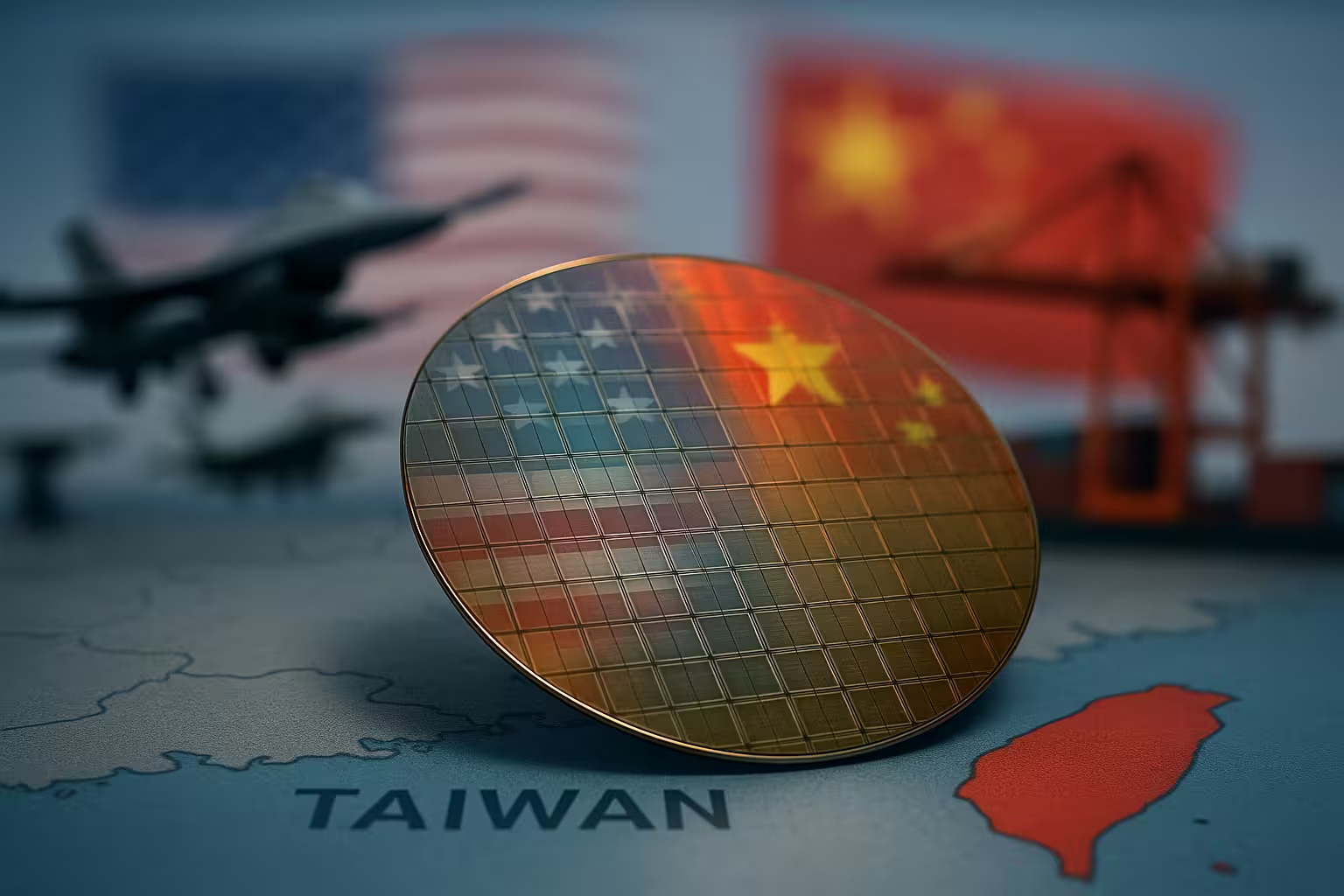China, America, and the Taiwan Flashpoint
Military drills, supply chain reroutes, and semiconductor risk sharpen investor focus. Markets face three war scenarios, with chip stocks, defense names, and freight rates acting as key signals.

What Geopolitical Risk Means for Markets
Taiwan just wrapped day two of its ten-day Han Kuang war games, a full run-through of how the island would keep command posts alive under a Chinese first strike. Beijing answered with fighter patrols that crossed the strait’s median line and live-fire drills off Taiwan’s southwest coast. Washington is not standing still. The Pentagon has flagged a fresh surge in Patriot missiles, F-16 spares, and MQ-9B drones, yet the running backlog of undelivered U.S. kit still tops US$21 billion, leaving Taipei short on magazines if trouble lands early.
Semiconductors sit at the heart of the risk. Taiwan cranks out about 60 percent of the world’s foundry output and more than 90 percent of leading-edge chips. A real blockade would idle TSMC lines, freeze the silicon that powers AI servers, and choke roughly US$3 trillion in downstream hardware sales. One Financial Times scenario study pegs a possible 30-plus percent drawdown in U.S. equities if a shooting war halts those chips and kicks Chinese listings off U.S. boards.
Local asset prices already tell a story. On April 7 the Taiex plunged almost 10 percent, its worst one-day fall on record, after a new round of U.S. tariffs rattled nerves. Foreign funds have pulled about US$11 billion from Taiwanese stocks this year, rotating cash into Korean and U.S. chip names while keeping one eye on the strait.
Supply chains are hedging in real time. Shipping firms are re-flagging vessels away from Hong Kong and sketching detours that skirt the Taiwan Strait, adding at least three sailing days to West-Coast routes. War-risk insurance quotes have jumped, lining up with the higher rates seen when Red Sea traffic came under fire earlier in the year.
Three market paths
- Status-quo tension – Beijing keeps pressure below the shooting threshold. Chips stay cheap to ship, and investors treat every scare as a buy-the-dip moment.
- Quarantine or limited blockade – China starts inspecting cargoes and declares an air-defense zone. Freight and LNG prices spike, Asian equities give back 15-20 percent, and defense primes plus non-Taiwan fabs outperform.
- Full invasion – Sanctions carve China out of the dollar system, Taiwanese exports stop, and global indices gap lower 30-40 percent. Dollars, short Treasuries, and gold catch strong bids while on-shore chip capacity in the U.S. and Korea rerates higher.
Investor playbook
- Spread chip exposure across Samsung, Intel, GlobalFoundries, and the new TSMC plants in Arizona and Japan.
- Own defense cash flow – Lockheed, RTX, and Northrop sell hardware every side wants.
- Track freight premiums – rising war-risk quotes often flag fresh tension before the headlines.
- Stress-test China positions for delisting risk and yuan swings.
Until chip supply is less Taiwan-centric, each PLA fly-by or U.S. arms deal will jolt equities, freight, and currencies. Stay nimble, keep hedges tight, and treat any clear step back from the brink as a window, not a promise.
Sources
https://www.reuters.com/business/aerospace-defense/taiwan-launches-annual-war-games-with-simulated-attacks-against-military-command-2025-07-09/
https://www.aljazeera.com/news/2025/7/9/taiwan-holds-huge-war-games-to-role-play-chinese-invasion-scenarios
https://www.reuters.com/world/china/taiwan-flags-chinas-shooting-drills-off-southwest-coast-2025-02-26/
https://tsm.schar.gmu.edu/taiwan-arms-backlog-february-2025-update-early-trump-admin-arms-sales-and-rumors-of-a-big-request-from-taiwan/
https://www.visionofhumanity.org/the-worlds-dependency-on-taiwans-semiconductor-industry-is-increasing/
https://www.ft.com/content/0a9c0367-aec8-4abe-ae80-670d3b1bc8f7
https://www.reuters.com/markets/asia/taiwan-stock-exchange-unveil-more-market-stabilisation-steps-if-needed-2025-04-07/
https://www.reuters.com/world/china/no-place-hide-any-china-taiwan-conflict-investors-say-2025-05-22/
https://www.reuters.com/markets/shipping-firms-pull-back-hong-kong-skirt-us-china-risks-2025-03-06/